- Home
- Jacob Peppers
A Warrior's Burden: Book One of Saga of the Known Lands Page 2
A Warrior's Burden: Book One of Saga of the Known Lands Read online
Page 2
“Is that so?” the sneering man said. “And just what do you know of it?”
Cutter glanced at him, saying nothing, letting the silence speak for him, for while he had his talents, words had never been one of them. After a time, he turned back to the eldest. “Their job will be easier at night. When everyone’s tired.”
The woman nodded slowly. “Perhaps, they don’t mean to hurt us,” she said, and although she controlled her features carefully, he heard the hope in her voice. “Perhaps they only come to ask questions.”
“Such men as this do not ask questions.”
She winced. “Then to recruit some of our young men, perhaps. After all, they have come before.”
He didn’t answer, didn’t bother telling her that they would not send so many, if they intended only to recruit. He did not tell her that those times of recruitment had been during the Fey War, a war which was—at least on the surface—now over. He did not tell her because she—like those others in the common house, with their pale faces and restless, fidgeting hands—knew the truth already.
Finally, she sighed. It was a weak, weary gesture, a world of meaning hidden within it. “Listen, Cutter…” She hesitated, as if unsure. Then, “We in Brighton are many things. We are resourceful, brave, and, I think, able to scrape out a living where few others would—or could. But we are not warriors. We are not soldiers.”
“No.”
She rubbed at her temples with a liver-spotted hand as if she felt a headache coming on. And, the man thought that was a damned shame. After all, a headache wasn’t the only—or anywhere near the worst—thing coming.
“What I mean…” she tried again, shaking her head as if annoyed at herself. “Look, I’ll be straight with you, Cutter. I don’t know your real name, and I’ve never asked. Since the day you showed up, I figured you wanted your privacy, and I did everything I could to make sure you had it. So when you killed that boar that attacked one of the younglings, and folks started callin’ you Cutter, I figured that’d do fine for me. Shit, it still does. But only…what I mean is that it’s clear you know somethin’ of fightin’. More’n the rest of us anyway. Stones and starlight, a body only has to look at those damned arms and shoulders of yours to know as much. So, I thought I’d ask if—”
“I’m not that man anymore.”
The woman opened her mouth as if to speak, as if to argue, but finally closed it again and gave a single nod.
“Not that man,” the sneering elder hissed from the other side of the table. “I doubt you ever were. Folks walkin’ around actin’ like you’re some demon on account of you got a lucky swing in with an axe and split a pig in two. Well, you might have them fooled, but some of us ain’t as easy as others. You ask me, they ought to call you coward.”
There had been a time when the man he’d been would never have stood to be called such things, where he would have settled the matter in blood. But that had been a long time ago, and he was that man no longer, so he only gave a slight shrug of his fur-covered shoulders.
“Cutter, indeed,” the man hissed.
“That’s enough, Telster,” one of the other elders, a stick-thin man with long, stringy gray hair and a quaver in his voice said. “There’s no call—”
“You ask me there’s more than enough call,” Telster spat. “We been plenty good to this coward here,” he went on, throwing the word at him again as if the second might wound where the first had not, “gave him a place to stay, ain’t asked nothin’ of him, and now—”
“Enough.” This from the eldest, and Telster scowled but relented, scrunching his shoulders and glaring at the man called Cutter with eyes that said he wished for nothing more but to see him dead. The problem, though, that Cutter could have told him had he asked, was that wishing accomplished nothing. He knew that better than most.
“Everyone out,” the eldest said.
All the elders turned to look at her with surprise, each beginning to protest, each cutting off when she raised one of her frail, liver-spotted hands. “Out,” she said again. “I need a moment alone with Cutter.”
They filed out, Telster sneering as if he’d like to see him killed, the rest hopeful as if they thought he might save them. They would all be disappointed. Many had tried to kill him in his life—human and Fey and worse—and none had succeeded so far, no matter how much he might have wished they had. And as for helping…well, he was not that man, had never been, and even if he had it would have made no difference. What was coming was far too much for any one man to stand against.
Eventually, they were all gone, the last closing the door behind them, and he was left alone with the leader of Brighton. She still sat at the center of the table, watching him. Finally, she spoke. “You are sure that there’s no way to get the villagers to safety?”
He shook his head. “They’d catch you. Once you’ve seen them, it’s too late.”
“Yet you will run anyway.”
“Yes.”
“Will you take the boy with you?”
He felt his eyebrow twitch at that, his mouth opening a fraction.
Not much, but then the man known as Cutter was not known for showing emotion, and what might have been insignificant on another was like a scream coming from his throat.
“Oh, please, Cutter,” she said, rolling her eyes. “I’m no fool, no matter what the folks in town think, and if I’m old and addled, then I’m still not blind. Not yet. We don’t get many visitors out here in Brighton as you well know. A couple who’ve never been able to have a child suddenly appear in town with a baby that was five, six months old unless I miss my guess, then you arrive barely a week later? Doesn’t take a scholar to sort that puzzle out, does it?”
“I guess not.”
“So. Will you take him?”
“Yes. If I can.”
She snorted. “You can. The boy practically worships you, you know that.”
“He shouldn’t.”
She shrugged. “The young are young for a reason—they’re the best at it and the only ones likely to survive the terrible choices they make. Anyway, should or shouldn’t makes no difference. We were all that young once, after all.”
“Not that young.”
“You’ll have to forgive Telster. He’s been around a time. Why, I’ve known him for years, even since before the Fall. We were on the same escape boat together, if you can believe that.” She paused, a tear winding its way down one craggy cheek. “We stood side by side, watched the capital be overrun by the Skaalden. By those…those things.” She paused again and for a moment, he thought that she would not go on. Then she cleared her throat, giving her head a shake as if to banish her memories, and Cutter wished it were only so easy. “Over thirty years ago, but I can still hear the screams,” she went on finally. “What I mean is, Telster, he changed that day.”
“We all did.”
“Yes,” she nodded. “Yes, we did. But some men, when tragedy comes upon them, grow from it, bloom like a flower in shit. And others…well, it’s like that tragedy tears at ‘em, hollows ‘em out ‘til there’s nothing left but bitterness and the memory of what was taken. You understand?”
He nodded. “I won’t give it a second thought.”
She studied him then, the corner of her mouth upturned in a humorless smile. “No, no, I don’t think you will, will you?”
He understood that she was not asking him just about the man, Telster, not now, but he had no answer he could give, none that might offer her any comfort, and so he said nothing.
After a moment, she gave a heavy, weary sigh. “I’m old, Cutter. Older than I’d expected I’d ever be. Older than my mother was when she died during the Fall. My father too. Fire and Salt, there’s only a handful in this village that are older’n me, if you take any two and add them together.” She paused, but he didn’t speak. “What I’m saying is, well, I don’t have any illusions about what’s comin’ my way. It’s been comin’ for near on eighty years now. In your twenties, shit, maybe even in y
our thirties, you’re able to fool yourself into thinkin’ death, growin’ old, those are things happen to other folks, not you. They say you get older, you get more wisdom. I can’t say as I rightly agree, except that you get a better understandin’ of how fragile life is, yours as much as everyone else’s. Maybe that’s all wisdom really is, in the end.”
“Maybe.”
She smiled. “Listen to me, goin’ on harpin’ as if it’ll make any difference. Closin’ the barn door once the chickens are out, my pa woulda said. Still, I appreciate you humorin’ me. Do you think you can make it? You and the boy, I mean?”
“For a while.” He shrugged. “As you say, no one makes it forever.”
She nodded at that, her expression growing sad. “You don’t mind, I think I’ll tell myself you made it all the way. After all, I think it’ll make it easier, knowin’ someone made it out.”
She needed something from him, he thought, some sort of reassurance. But he was no priest—just about as far from it as a man could be—and he had no reassurances to give, so he only stood in silence regarding her. She sighed. “The damndest thing. Seems for the last few years, ‘bout all I do is bitch and moan about this new ache or that one. More and more often, find myself thinkin’ that it’ll be a blessin’ to close my eyes and not open ‘em again, to be buried out at the edge of the Black Wood, next to my father and mother and brother, Jim, whose been dead goin’ on forty years now. But now, now that it’s upon me, I’m afraid.” She gave a laugh with no humor. “S’pose you must think me a coward.”
Cutter shook his head. “No, not a coward. You’re afraid, and you’re right to be. I’ve seen it before.”
She watched him with a strange look in her eyes. “I believe you. I surely do. Tell me, Cutter. I get the feeling you’re somebody, maybe somebody important. Or that you were. Once. Will you tell me? You don’t have to, if you don’t want, but I promise your secret’s safe with me.” She gave him a small, wistful smile, one that he could tell cost her something. “Always been shit at keepin’ ‘em—I like to talk too much—but even I can manage a few hours, I think. After that…well, the dead tell only the one story, and it’s long since not been a secret.”
He winced. He didn’t want to do it, didn’t want to see the look in her eyes, the same look he’d seen in so many others for so many years. Hate and awe, fear and disgust all wrapped up together, knit so tightly you couldn’t tell one from the other. He wasn’t sure why he did it, why he stepped forward and whispered that name—a name that was used as a curse in many places and as a blessing in others—into her ear. The name he had tried to leave behind him for fifteen years. But a man can’t outrun his past, his name, any more than he can outrun himself. After all, no matter how fast you go, no matter where you turn up, well, there you are.
She gave a sharp intake of breath and jerked away, studying him. Looking to see if he was lying, maybe. Not joking, for there were some names a man wouldn’t say, even in jest. He only watched her, expressionless, leaning back himself and letting her take her time. She rubbed a hand across her mouth, and her skin was pale, ashen. “I…thank you. For tellin’ me.”
But she didn’t, not really. He could see the truth of that in her eyes as he had seen it in others long ago. She wished she didn’t know, and he understood. He wished he didn’t, too.
He turned to go then, opening the door, the frigid wind striking him almost like a physical blow. It might have been the roar of that wind which made her voice sound so small, so afraid, but he didn’t think so. “Cutter?”
He glanced back at her. She had risen from the table. It should have made her look bigger, but it did not. She looked smaller. Afraid. “Good luck.”
He thought that some might have known the words to say then, words to set her at ease about what was coming, about what would happen, to lend her some strength she might use in the following hours. But if such words existed, he did not know them. He never had. For his had never been a way of peace but of war, and the only strength he knew was in the swinging of the axe, the only ease he’d ever felt that of victory, when his enemies lay low beneath him. He didn’t wish her luck. Luck didn’t factor into it, not anymore. They were coming, that was all, and with no doubt of what they would do once they arrived. Nothing to say then, so he said nothing at all, walking out into the heavy snow and shutting the door behind him. She did not follow.
CHAPTER THREE
I’ve heard the stories, the ones painting my brother as some…some psychopath.
Some mindless killer who bathes in the blood of his victims.
Lies, one and all. My brother is a warrior. A soldier.
And he does what he does not because he enjoys it.
He does it because he must.
—Prince Feledias in interview with Exiled Historian to the Crown, Petran Quinn
The village was busier, more alive than he’d ever seen it. He had seen similar from soldiers who, fearing their deaths in a battle, drank and laughed and lived as hard as they could for as long as they could. There was always an undercurrent to that laughter, one that made it seem as if it might turn into a scream at any moment, and there was always a desperation to the way they drank, the way they lived, as if life were a wash cloth that might be squeezed dry before its time.
But here, at least, there was no laughter, desperate or otherwise. Men and women rushed to and fro, all in a hurry—but some, it seemed to Cutter, having no idea what, exactly, they were in a hurry to do. Thinking only that they should be doing something, anything. He could have told them that it did not matter, that whatever they did, they would all be dead before the coming night gave way once more to the sun, but he did not. When death was certain, when one had nothing to look forward to but pain and loss, even vain hope was better than no hope at all.
Mothers and fathers fought each other to load their children onto the few carts the town had, hitching them up to the healthiest of horses. Which, Brighton being a snow village on the edges of civilization, weren’t particularly healthy. Life in the frozen wastes was hard for anyone, man or beast. Each year in the village stripped a little more of them away. At first, the stripping took only the dross—fat from the body, fat from the mind. All of it extra weight a man or woman dragged behind them through life, often not even aware of it. What was left, then, after a time, was no more than survival, muscle and sinew and bone. That was all.
But the stripping was never truly done. The world was not so kind that it ever stopped taking just because there was so little left to take. Like a greedy miser, it continued to rip and pull and tear, never satisfied with what it had taken, forgetting it, in truth, thinking only of what was left, of what else it might catch in its grip.
The horses, like the people around them, were products of such a stripping. Thin, poor things, as meager as the meals which sustained them. Beasts who may have journeyed to the freezing north fine and full of life, but ones that, over time, became pack animals and, when even such menial labor was beyond them, they were rewarded by being slaughtered and used for food, for in such a place as Brighton, when any wasting might lead to death, there was little room for sentiment.
Still, Cutter told himself that, perhaps, the children might make it away. A false hope, maybe, a vain one, but sometimes that was the only kind a man had. Besides, even those who came, cold and heartless as they were, were not animals. Or so he told himself.
A few of the villagers waved at him as he passed on his way back to his home, but not many. Fifteen years he had lived in this place—if living was the word, existing felt closer to the truth—and while he knew all their names, he did not know them. It was strange how a man could live among so many people, and yet remain so alone. He had not gotten to know them, not in fifteen years, and now he never would. Death was never far in a settlement so near the Black Wood, but he was not just near, not now. Now, he walked among them, reaching out his hands to pull them all into his dark embrace, an embrace that no one could deny.
Cutter tr
udged through the snow, toward his house on the outskirts of the village. Some of the doors of the houses he passed had been latched tight, as if to keep what was coming out. Others had been thrown wide, as if by inviting him in, Death might be swayed to let them pass. But there was no lock strong enough to keep death out, and he was never swayed. That much, Cutter knew. That much, he had learned long ago.
At the base of many of the houses, offerings had been lain. Fruits and vegetables—poor, wretched looking things compared to their counterparts in the warmer climates of the south. Food that, the day before, the people of the village would have desperately needed, but tomorrow their thoughts would not be on food or the lack, for the dead had no thoughts or, if they did, they were dark ones. Still, he understood.
Each dealt with his coming death in his own way, the only way he knew how. One was not any better than the other, was only a way of making it to the end. True, the Fey had responded to such offerings once—the sprites and pixies mostly, but sometimes their greater kin. Yet, that had been a long ago, before the war. And even before that, the creatures had always been fickle things, as liable to be offended as grateful, and in either case largely irrelevant. Not that it mattered. The Fey would not show up to accept such offerings, even if they’d had a mind.
They had been driven back, back to the heart of their territory, the Black Wood, and even this close, even on this snow-swept wilderness of a village, they would not risk showing themselves. They had once, had come to greet Cutter and his people with open hands, open talons, and they had not been welcomed kindly. Cutter knew that better than most, for he had been one of those in charge of that welcome, one of blood and steel and death. And betrayal.
Finally, he reached his house. Here, there were no desperate shouts of men and women making what preparations they could, preparations that would, in the end, be pointless. No horses neighed, no children cried for reasons they did not know, only because their parents were afraid. It was only him, and his house, far enough away from the village, far enough away from life that he never had to live it.

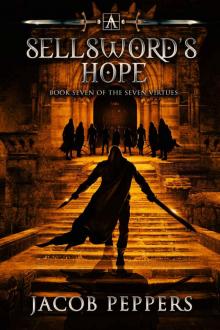 A Sellsword's Hope
A Sellsword's Hope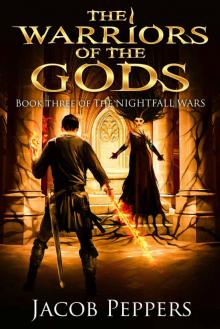 The Warriors of the Gods
The Warriors of the Gods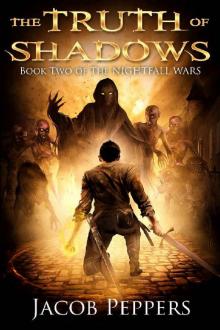 The Truth of Shadows
The Truth of Shadows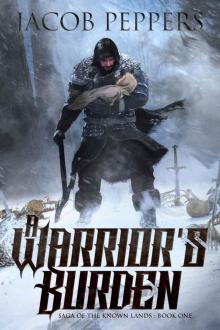 A Warrior's Burden: Book One of Saga of the Known Lands
A Warrior's Burden: Book One of Saga of the Known Lands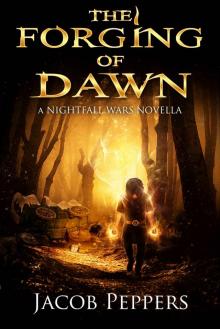 The Forging of Dawn
The Forging of Dawn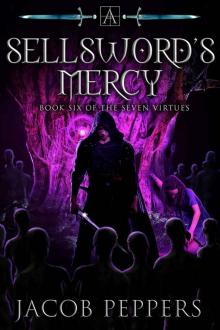 A Sellsword's Mercy
A Sellsword's Mercy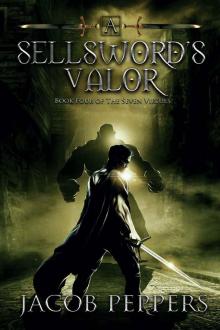 A Sellsword's Valor
A Sellsword's Valor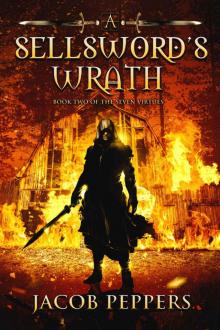 A Sellsword's Wrath
A Sellsword's Wrath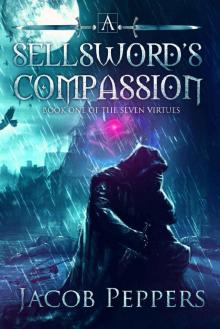 A Sellsword's Compassion_Book One of the Seven Virtues
A Sellsword's Compassion_Book One of the Seven Virtues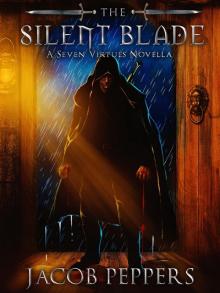 The Silent Blade: A Seven Virtues Novella
The Silent Blade: A Seven Virtues Novella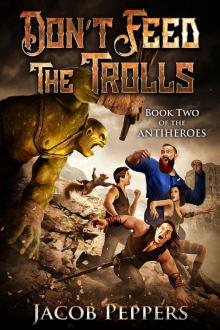 Don't Feed the Trolls
Don't Feed the Trolls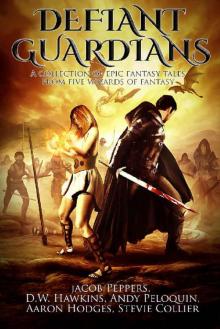 Defiant Guardians Anthology
Defiant Guardians Anthology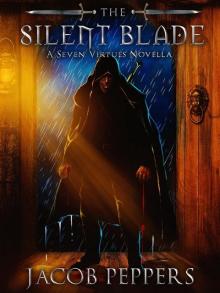 The Silent Blade
The Silent Blade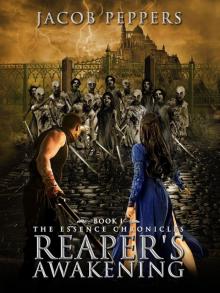 Reaper's Awakening
Reaper's Awakening